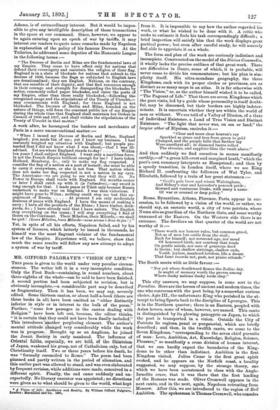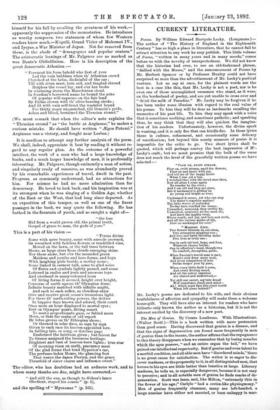MR. GIFFORD PALGRAVE'S " VISION OF LIFE."* Tam poem is
given to the world under very peculiar circum- stances. The writer left it in a very incomplete condition. Only the First Book—containing, in round numbers, about three-eighths of the whole—can be said to have been finished. A second portion had been subjected to revision, but is obviously incomplete,—a considerable part may be described as fragmentary. Then it has been, we may say, severely edited. Some thirteen cantos, or about half-a-book (there are three books in all) have been omitted as " either distinctly inferior in style or in interest to the bulk of the poem." Further, " some few passages in the cantos dealing with Religion" have been left out, because, the editor thinks, " it is certain that they could not have been finally included." This introduces another perplexing element. The author's mental attitude changed very considerably while the work was in progress. Brought up as an Anglican, he joined the Jesuit Society in early manhood. The influence of Oriental faiths, especially, we are told, of the Shintoism of Japan, weakened his grasp, not of Catholicism only, but of Christianity itself. Two or three years before his death, he was "formally reconciled to Rome." The poem had been planned and partly written in the period of alienation, and this earlier part was allowed to stand, and was even elaborated by frequent revision, while additions were made, conceived in a different spirit. Finally, the end came suddenly and un- expectedly. No literary executor was appointed ; no directions were given as to what should be given to the world, what kept • A Vision of Life: Semblance and Reality. By William Gifford Palgrave. London: Macmillan and Co. lea.
from it. It is impossible to say how the author regarded his work, or what he wished to be done with it. A critic who seeks to estimate it feels his task correspondingly difficult ; a brief inspection will satisfy him that the work displays great poetical power; but even after careful study, he will scarcely
feel able to appreiate it as a whole.
The form and plan of the work are curiously indistinct and incomplete. Constructed on the model of the Divina Commedia, it wholly lacks the precise outlines of that great work. There
are difficulties in Dante, some of which, it is probable, will never cease to divide his commentators; but his plan is sim- plicity itself. His ultra-mundane geography, the three Kingdoms, each with its proper circles or provinces, are as distinct as so many maps in an atlas. It is far otherwise with " The Vision," or, as the author himself wished it to be called, " The Pageant of Life." That there are seven Kingdoms which the poet visits, led by a guide whose personality is itself doubt- ful, may be discerned, but their borders are highly indeter- minate. It is uncertain whether they are within the world of men or without. We are told of a Valley of Illusion, of a Gate
of Individual Existence, a Land of True Vision and Distinct Existence. " The light that never was, on sea or land," the largior ather of Elysium, encircles it :— " Clear and more clear heaven's ray
Sparkled as grass and tree from green to gold Changed, and the purple hills that farther lay Were amethyst all ; in diamond lustre rolled The streams, and sapphire-blue the vault above."
And then suddenly we find ourselves in scenes manifestly earthly,—of " a green hill-crest and margined heath," which the poet's own summary interprets as Hampstead; and then by a speedy transition, in London itself, where we see King Richard IL confronting the followers of Wat Tyler, and Elizabeth, followed by a train of her great statesmen :—
"Cecil's pale brow and wisest Walsingham, And Sidney's star and Leicester's peacock pride ;
Howard and venturous Drake, with many a name Of war or counsel or deep policy."
Rome, Byzantium, Athens, Florence, Paris, appear in suc- cession, to be followed by a vision of the world, or rather, we should say, an esoteric world, a city of true patriots, where Numa sits as guardian of the Northern Gate, and some worthy unnamed at the Eastern. On the Western side there is no entrance. The dwellers on that quarter of the world are not worthy of it :—
" There worth nor honour rules, but common greed, Not as of men but cattle from the stall; Each for himself; nor reverend age, nor mead
Of honoured birth, nor courtesy that tends On gentle minds, nor care of generous deed Is theirs; but shallow strivings, shallow ends, Youth joyless, manhood loveless, life a dream That fame records not, past, nor praise attends."
The South meets with as little favour :—
" Nor yet where Southward flames the Zodiac day,
Is aught of memory worth the groves among Where dusky nations dusky lords obey."
This city answers, we may suppose, in some sort to the Paradise. Here are the heroes of ancient and modern times, the one who converses with the poet being, by a somewhat curious
choice, Agis III., the unfortunate King who perished in the at- tempt to bring Sparta back to the discipline of Lycurgus. This is in the Northern quarter; there is an Eastern, peopled with
Asian heroes, none of whom, however, are named. This canto is distinguished by its glowing panegyric on Japan, to which
the poet is transported in a vision. Outside the City of Patriots lie regions, penal or purgatorial, which are briefly described ; and then, in the twelfth canto, we come to the Seven Kingdoms, "corresponding to the seven chief pursuits of man : Love, Ambition, Art, Knowledge, Religion, Science, Pleasure," so manifestly a cross division of human interest, that we can hardly expect the boundaries of the King- doms to be other than indistinct. Ambition is the first Kingdom visited. Julius Caesar is the first great spirit evoked, and he appears on the Norfolk coast, a locality suggested, we may suppose, by the strange theory, one
which we have been accustomed to class with the .Anglo- Israelite craze, that it was there that the first landing of the Romans was made. Oliver Cromwell appears in the next canto, and in the next, again, Napoleon retreating from Moscow. After this, we are introduced to the region of Evil Ambition. The spokesman is Thomas Cromwell, who consoles
himself for his fall by recalling the greatness of his work,— apparently the suppression of the monasteries. He introduces as worthy compeers, two statesmen of whom few Western readers know much,—Kiiprili, Grand Vizier of Mahomet IV., and Iyeyas, a War Minister of Japan. Not far removed from these, is the abode of " demagogues and popular orators." The aristocratic leanings of Mr. Palgrave are as marked as was Dante's Ghibellinism. Here is his description of the great democratic Athenian Foremost his form behold who first of yore Led the vain babblers when th' Athenian crowd Clutched at the helm, disdainful of the oar; Till with riven mast, torn sail, and tangled shroud Helpless the vessel lay, and o'er her broke In whelming storm the Macedonian cloud.
In freedom's borrowed name he bound the yoke
Of popular will supreme on the fair land By Pallas cloven with th' olive-bearing stroke ; And lit with vain self-trust the wasteful brand For thirty years unquenched, till Graecia's pride, Ashes and blood, bestained the Thracian strand."
(We must remark that when the editor's note explains the " Thracian strand " as " the battle at Arginusge," he makes a curious mistake. He should have written ".Egos Potami." Arginusm was a victory, and fought near Lesbos.)
It is needless to attempt any further analysis of the poem. We shall, indeed, appreciate it best by reading it without re- gard to any regular plan. As the outcome of a powerful intellect, the work of a man who had a large knowledge of books, and a much larger knowledge of men, it is profoundly interesting. Mr. Palgrave, though eminently a man of action, and singularly ready of resource, as was abundantly proved by his remarkable experiences of travel, dwelt in the past. Pr3gress, as commonly understood, had no attractions for him. For science he had no more admiration than for democracy. He loved to look back, and his inspiration was at its strongest when he was singing of a Golden Age, whether of the East or the West, that had long since departed. As an exposition of this temper, as well as one of the finest passages in the book, we may quote the following. He has bathed in the fountain of youth, and so caught a sight of-
" the lore
Hid from a world grown old, the primal truth, Gospel of grace to man, the gods of yore."
This is a part of his vision :—
" Forms divine
Some with mere beauty, some with aureole crowned,
Or wreathed with fadeless flowers or tendrilled vine, Moved on the lawn, or the tall trees between Shone, as large stars from clouds emerging shine.
Nor these alone, but o'er the mounded green Maidens and youths and hero forms, and boys With laughing girls beside, a motley scene ; Some linked in earnest talk, some to glad noise Of flutes and cymbals lightly passed, and some Loitered in smiles and jests and amorous toys.
And overhead in many-coloured loom Of living forms it seemed, height over height, Converse of earth uprose th' Olympian dome.
Infinite beauty matched with infinite might,
And each to each reflex, as cloudless skies
Give and receive great ocean's tremulous light. For there th' earth-ruling powers, the deities In happier days known and adored, their court Once more an hour displayed to mortal eyes ; Erst on Olympus' peaks, fitting resort To man's proportionate gaze, or fabled more Meru, or that far realm of old report By lotus groves on th' Ethiopian shore ; Or throned in solar fires, as sign by sign Given to each race its heaven-appointed lore. In fabling tale, or song, or dateless page Enshrined the heirloom given ; but fairest far To Greece assigned the luminous heritage. Brightest and best of heaven-born lights ; true star
Of morning risen on earth, precursor meet
Of the glad forms that tend Hyperion's car, The perfume-laden Hours, the glancing feet
That weave the dance Pierian, and the grace
Threefold of sister charm and influence sweet.'
The editor, who has doubtless had an arduous work, and to whom many thanks are due, might have corrected,- " And still the sun, as though to Gideon's lance Obedient, stayed his course " (p. 5),
and the spelling of " Mycaenae " (p.



































 Previous page
Previous page